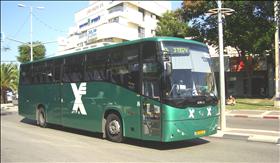74% of Israelis want to change the "status quo"
Support for public transporation on Shabbat at highest level ever
What gives Israel its Jewish character? Is it liberty, justice and peace, as taught by the Hebrew Prophets, or is it the lack of public transportation on Shabbat, which greatly restricts the weakest sectors of Israeli society?
01/05/2015 12:37
Tags: transportation · Yisrael Katz · Shabbat

Egged Bus
A renewed, heated public debate recently erupted over Israel’s transportation policy, ignited by the shut-down of public transportation for two and a half days at the end of Passover and on Shabbat, which was described by many Israelis as a forced “curfew”. Notably, a special Hiddush poll shows that public support (among the adult Jewish population) has reached an all-time high: 74%!
Throughout most of Israel, there is no public transportation on Shabbat and holidays. This is a result of extortionist pressure from the Orthodox parties who tie such nationwide religious restrictions to their support for the government, and the willing surrender of the large, secular parties (right, left and center) who represent the majority of Israeli society.
In response to the protesters, Likud Minister of Transportation Israel Katz, claimed that the absence of public transportation on Shabbat preserves the Jewish character of Israel, which is patently hypocritical for at least two reasons. First, more people own automobiles in Israel as a result of these government restrictions, and more vehicles can be found on Israel’s roads on Shabbat than there would be if public transportation were available. Secondly, the idea that Israel’s Jewish character should be defined by a lack of public transportation on Shabbat is a sad departure from the promise of Israel’s Declaration of Independence, which established that the state would be based upon the precepts of liberty, justice and peace, as taught by the Hebrew Prophets.
Minister Katz further announced that he does not intend to change the ongoing prohibition against public transportation on Shabbat, and lashed out at the proponents of change as political “leftists”. Of note, therefore, is the fact that among the supporters of public transportation on Shabbat are 72% of voters for the Likud! 74% of the Jewish public (including 70% of Likud voters) reject MK Katz’s charge that this is nothing but a leftist campaign, affirming the view that this issue transcends political boundaries.
Support for the initiative to provide public transportation, even if limited, on Shabbat and holidays has consistently risen in recent years, as gauged by Hiddush’s systematic polling of public opinion, from 58% in 2010 to 74% today (63% in 2011 & 2012; 64% in 2013; 70% in 2014), and has now reached 74%, three-quarters of the Jewish public! Of which: 52% are in favor of public transportation on a limited scale ("Main bus lines and less frequent service. Perhaps using vans"). 22% support full-scale public transportation, 16% support maintain the current “status quo”, and 10% support further eliminating even what is currently allowed.
The survey was conducted on April 13th and 14th, among 500 people / a representative sample of the adult Jewish population.
This is a result of extortionist pressure from the Orthodox parties who tie such nationwide religious restrictions to their support for the government, and the willing surrender of the large, secular parties (right, left and center) who represent the majority of Israeli society.
Among those who support having public transportation available on Shabbat in Israel: 72% of Likud voters, 89% of Kulanu voters, 92% of Yisrael Beiteinu voters and nearly half of Jewish Home voters (47%). 98% of voters for the ultra-Orthodox parties oppose public transportation on Shabbat. Support among secular Israelis has reached 95%, among immigrants from the former Soviet Union - 92%, and among traditional Israeli Jews – 72%. However, 100% of the ultra-Orthodox and 74% of the Zionist Orthodox oppose this initiative, and 73% of the ultra-Orthodox support cancelling the very few lines in operation on Shabbat today.
74% of the Jewish public assert that “the battle for public transportation on Shabbat is a broad public issue, which transcends the political boundaries between the left and right”. Among them: 70% of Likud voters, 85% of Yisrael Beiteinu voters, and 79% of Kulanu voters, all parties projected to join the next coalition government. Only 26% agree with Likud transport minister Yisrael Katz’s contention that this battle is a left-wing campaign against the government. Among them are 91% of voters for the ultra-Orthodox parties and 58% of Jewish Home voters. Among secular Israelis, 93% believe this is a broad struggle that transcends political boundaries, as do 91% of immigrants from the FSU.
Head of Hiddush Rabbi Uri Regev said in response, “the demand to allow public transportation on Shabbat in Israel is just, necessary and of great importance, and therefore enjoys growing majority. The gulf of difference between the public’s position and that of the politicians who claim to represent us is intolerable. The opponents of public transportation on Shabbat are not enhancing Israel’s Jewish character but, rather, are breeding hatred against Judaism itself.
This is a battle for the weakest sectors such as the poor, the elderly and our youth, a battle to protect our soldiers who die in car accidents when they come home for a weekend reprieve and go for some R&R, often involving alcohol”. According to Regev, “The enjoyment of Shabbat for the secular and traditional public, just as for non-Jews, should allow them to not be in imprisoned at home. The continued surrender of Israel’s secular politicians to ultra-Orthodox political extortion, against the clear desire of the public, erodes respect and trust in the political process, undermines core democratic principles, alienates Israelis from Judaism and distances Israel from world Jewry”.